|
Last Wednesday, 19th April, marked the 50th anniversary of the release of David Bowie’s seminal sixth album, Aladdin Sane. On the road touring The Rise and Fall of Ziggy Stardust and the Spiders from Mars, the wildly creative Bowie was already penning tracks for his next musical outing, touching down in Trident Studios and RCA in, respectively, London and New York, to record these fresh ideas. Harnessing the Spiders from Mars (guitarist Mick Ronson, bassist Trevor Bolder, and drummer Mick Woodmansey), Bowie sought out innovative talent to take the recordings into bold new directions. Mike Garson was the avante-garde pianist Bowie chose to sprinkle dustings of keyboard magic. Mike Garson, piano maestro After gaining notice of Garson’s experimental jazz style, he requested the 27-year-old New Yorker add swirling solos to the album’s title track. Initially, Garson played bluesy, then Latin-flavoured overdubs to the song’s basic rock ‘n’ roll template. Bowie urged him to throw caution to the wind and attack the keys as he would during some late-night jazz free-for-all. Garson duly obliged, producing a mesmerising solo. Detaching from the song's basic A and G chords, the notes fizzle, collide, and swirl all over the place, like some sonic interpretation of a murmuration of starlings scattering during a falcon ambush, dancing over every key, and into spaces far beyond any conventional scale; finally chiming with the melody in perfect time to synchronise with the chorus. Most incredibly of all, the result was captured in one take. Garson’s accompaniment to the concluding track, ‘Lady Grinning Soul,’ is more grounded, but still cascades in psychedelic whirlwinds around Bowie’s plaintive vocal. Garson continued collaborating with Bowie for the next few years, going on to become a lifelong friend. No other co-musician played alongside Bowie more often (between 1972 and 2004, Garson guested in over 1,000 shows, performing on more than 20 of Bowie’s albums.) Interviewed on Stuart Maconie and Mark Radcliffe’s BBC Radio 6 show from his LA home last Sunday morning, Garson admitted the key place Bowie held in his heart. He emphasised the intensity of their musical alliance by telling a tour anecdote. One young female fan approached Garson after a gig and explained exactly how important ‘Aladdin Sane’ and the other songs from that era were to her. The uplifting potency of Bowie's music had literally saved her life when she had undergone a dark period and contemplated suicide. The Jean Genie I recall how electrifying it was hearing ‘The Jean Genie, the first of four singles to be released from the album, in November 1972. It reached number 2 in the singles chart. I was 10, just getting into all the glam rock bands that would eventually appear regularly on Top of the Pops spearheaded by Bowie’s chameleon-like, androgynous stage persona and Ronson’s crunching Gibson Les Paul riffs. Bowie's most successful single to date was all over the radio, coinciding with the heady moment, a fortnight later, when my team, Hibernian, beat Celtic 2-1 in the final of the Scottish League Cup. Goals by Pat Stanton and Jimmy O'Rourke put Hibs in the driving seat, and Kenny Dalglish's strike with 13 minutes to go wasn't enough to prevent the capital club gaining their first trophy since winning the Scottish League in 1952. Bowie’s striking mullet was a stylistic reference point for many older local teenagers; growing up in Shandon on Edinburgh's west side, typified by the local gang, YST, hanging around outside the launderette on the corner of Harrison Gardens in baggy trousers, stack heels, and star jerseys, chainsmoking Embassy Regal. If I had to pass them en route to the shops, my heart would patter. But their bold fashion, alluding to TOTP glam rock, terracing violence, and the perfume-drenched older teenage girls hanging around with them was a glimpse of a dangerous but alluring world beyond listening to cassette recordings of Bowie, T. Rex, Mott the Hoople, Gary Glitter (I know), Slade et al alone in my bedroom. The uplifting potency of Bowie's music had literally saved her life when she had undergone a dark period and contemplate suicide. A vicarious connection with Aladdin Sane? I played guitar and keyboards in a pop group, Little Big Dig, and in 1984 we recorded a session for Richard Skinner's BBC Radio 1 show, to be broadcast when Muriel Gray was sitting in for him (her then-boyfriend was our manager). Our four songs were taped in the same studio used by so many iconic musicians over the years, including Bowie and Mick Ronson when they collaborated for the first time, recording tracks for John Peel's show. The closest I ever got to hearing Bowie live was when he headlined at Murrayfield Stadium the previous summer. The sound system was powerful enough for my dad and me to hear everything, including his stage announcements, from the loft of our house, 1.5 miles away. Dad recorded a segment to play back to my wee sister, Anne who was among the thousands attending. Somewhere, at the back of a drawer, gathering dust, there are cassettes containing Dad's Bowie bootleg, and also the recording he made of Little Big Dig's Radio 1 session on Muriel's show. In my memoir 1976 - Growing Up Bipolar I describe the thrill of recording in Maida Vale studios. Our engineer that day was long-term BBC producer, Dale Griffin, former drummer of Mott the Hoople, the band who had been on the verge of splitting up until Bowie offered them his song, 'All the Young Dudes.' Produced by Bowie, it became an international hit. #Bowie #AladdinSane #glam
Comments are closed.
|
|
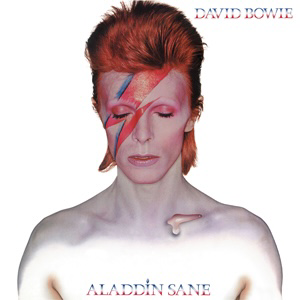
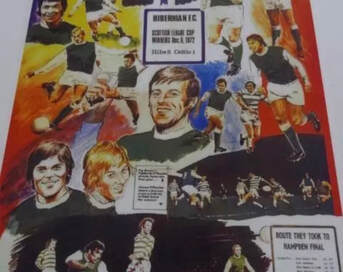
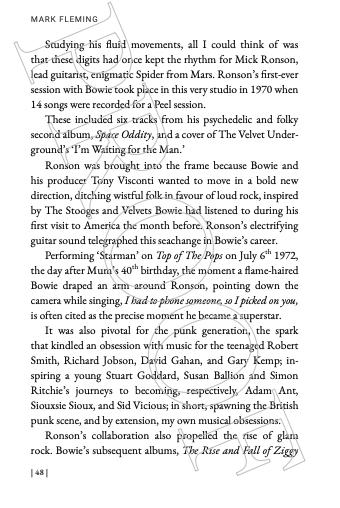
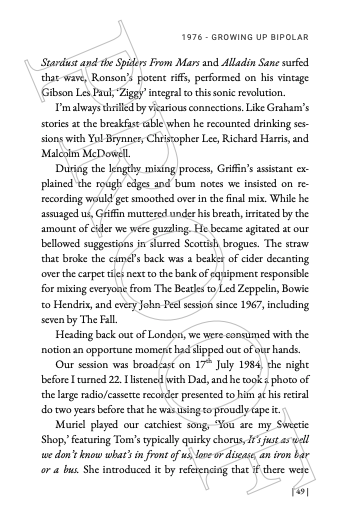
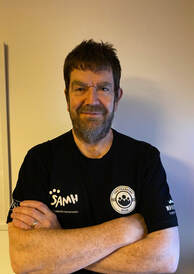
 RSS Feed
RSS Feed
